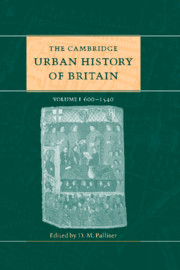2 - The origins of British towns
from Part I - Introductory
Published online by Cambridge University Press: 28 March 2008
Summary
The Cambridge Urban History begins with the seventh century because that was when permanent town life, on our definition, began in southern Britain. However, it would be wrong to plunge into the story of medieval British towns without at least some discussion of previous urban life in this island. The long Roman occupation of Britannia had entailed the introduction and development of towns on the Mediterranean model, and some scholars have argued that the occupation of some of those towns was never interrupted. The current consensus is for discontinuity at least of urban life if not of occupation; but no one doubts the importance of the infrastructure left by the Romans: the town sites, the road network linking them and in many cases the very shape of streets and town centres. This Roman prologue, as it were, is therefore of importance to later developments. Before it is faced, however, a little should be said of the possibility of recognisably urban settlements even before the Roman occupation.
Neolithic farming communities first appeared in Britain around 3500 bc, and by 3000 bc they were established in many areas. This development of settled agriculture led to the need for ‘central places’ and meeting places in the Neolithic and Bronze Ages, though to nothing yet recognisably urban as it did in the Middle East at the same time. The Iron Age, however (c. 500 BC–AD 50 in southern Britain), witnessed the development of tribal states with, probably, some form of central authority, accompanied by forms of settlement which may be interpreted as genuinely proto-urban.
- Type
- Chapter
- Information
- The Cambridge Urban History of Britain , pp. 17 - 24Publisher: Cambridge University PressPrint publication year: 2000
References
- 4
- Cited by

